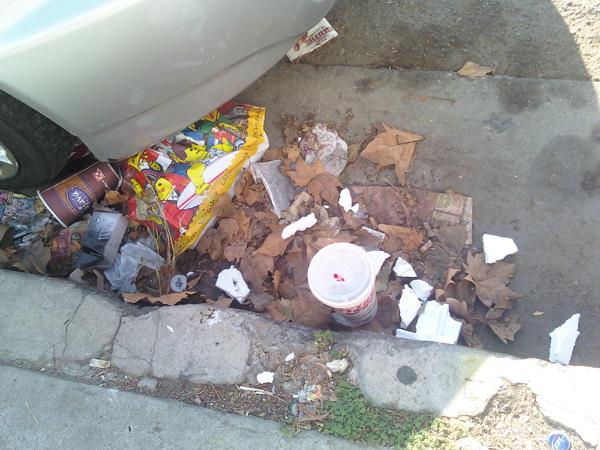These are excerpts from an email written to the environmental liaison of my City Councilman, who I met as she supervised a clean-up crew in Silverlake. Although specific to Hollywood, some of the ideas might be applicable in other cities.
..I have noticed that trash cans at bus stops on Hollywood and Sunset are often full to overflowing. Too many people won't, unfortunately, walk a few blocks with something they have to throw out, but they will usually make it to the nearest corner. It seems very hard to understand why there aren't more public trash receptacles in Hollywood, particularly on major avenues like Western. 
Your "Clean n' Green" brigades seem to be confined to the main arteries and public areas, I have yet to see any cleanup on residential streets. And yet a walk down Serrano, Kingsley, Romaine, Russell, Garfield, Mariposa, Alexandria--frankly, any street in Hollywood--will reveal some of the filthiest, trash-laden streets in America. They would be completely submerged if not for once-a-month gardeners hired by apartment landlords.
I've never seen anyone cited for not scooping their dog's defecation--the police won't even roll down the window and ask a dogwalker where his plastic bag is. I have the distinct impression that this indifference comes from the top down--are the police even asked to enforce this law during daily squad room briefings? The occasional $150 ticket is needed to address the impunity with which many dogwalkers view this law. The prevention of litter needs to be considered one of the elements of "broken window policing."
We also need to ban the distribution of fliers under car windows and on doorknobs. Every single week the auto insurance circulars pelt the neighborhood, and most of them end up tossed on the ground. (Restaurant menus, pizza discounts, and Walgreen circulars are close runners-up.) If this kind of ordinance meets too much resistance, perhaps instead one could be introduced that would require the same distributors to revisit the neighborhood to clean up the fliers that have been littered. In an era of disappearing forests and bulging landfills, it seems obscene that a city aiming to be green is allowing such profligate waste. Speaking of which, the annual distribution of new phone books is disastrous and anachronistic. How many trees are chopped down for a product that hardly anyone still uses? At the very least, distribution should be limited to once every two years.
The way 311 works, as far as special trash pickup, seems highly inefficient to me as well. I have yet to see a block that doesn't have one item on the curb every week, but if no one calls, that item can rot there for weeks, even months. (I call often, and the operator can never tell if the item has already been called in.) A far more intelligently designed system would be one in which everywhere presently covered was divided into 5 sections, each section visited each week. At present I've seen crews pick up one item but ignore another item down the street because it hadn't been reported. Left there, these items tend to attract more litter, sometimes becoming mini-dumps, which are obviously messy eyesores that ruin entire blocks. At the very least, police cruising by should be enlisted in phoning in or notifying via their cruiser laptops items that need picking up. They should have stickers (or perhaps parking enforcement personnel could do this) to stick to items that say: "CALL 311".
Obviously more trash bins would require more pickups, and more sanitation employees--a tough sell in the present economic environment. I would propose two revenue-raisers:
1) A fee levied on hotel/motels, recognizing the importance of tourism represented by a cleaner city.
2) A "trash tax" on fast food and takeout restaurants, as they generate an extraordinary amount of litter. (I would estimate 50% of what I pick up.)
Lastly, the need for a more proactive and aggressive effort to educate about littering cannot be underestimated. It seems to me that the Councilmen and Mayor are not using their bully pulpits to talk about this subject in schools, community centers, or neighborhood watch meetings. The topic is the neglected step-sister of current issues yet littering is a completely preventable scourge that makes a huge difference on a city's attractiveness and livability.
